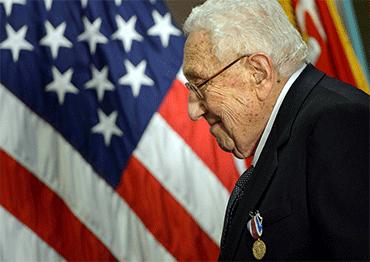Compared to the Cold War period, Kissinger had far less influence on American policymakers in recent years. Following the collapse of the Soviet Union, the US increasingly adopted what many describe as a liberal internationalist approach in its foreign policy, focusing on exporting its ideologies. The Biden administration, for example, explicitly claimed to take a “value-based” approach to foreign policy.
According to Jin Canrong, associate dean of the School of International Studies with the Renmin University of China, a major cause of the decline of realist thinking among American politicians and strategists is that they lack historical depth compared to their Cold War-era predecessors.
“During the Cold War, the US had a group of exceptionally talented strategists. George Kennan, who advocated for a containment policy against the Soviet Union, and Henry Kissinger, who opened the door to reconciliation between China and the US, are notable examples. Tadeusz Brzeziński, who played a role in formalizing diplomatic relations with China under the administration of US president Carter, was also commendable,” Jin said in an interview with guancha.cn.
“What they share in common is that they all experienced World War II and witnessed life-or-death situations. In comparison, foreign policymakers in the US of the post-Cold War period grew up in an era of peace,” Jin added.
Jin said that American strategists “may be graduates of prestigious schools like Harvard and Yale, but lack historical depth in their thinking as they have navigated their lives quite easily with rather simple life experiences.” “Therefore, they may be intelligent individuals, but lack great wisdom,” Jin said.
Wang Yizhou, associate dean of the School of International Studies at Peking University, attributed the waning influence of Kissinger to the change in political atmosphere around the globe. “Kissinger is not the friendship ambassador imagined by many Chinese,” Wang said, “Rather, he viewed the US’s need to advance its ties with China to weaken and confront the Soviet Union from a perspective of his country’s national interest.”
“The essence of Kissinger’s diplomatic legacy lies in that he took diplomacy as a more complex and more powerful tool than the sheer use of power, and for Kissinger, diplomacy is a skill, even an art,” Wang said in an interview with Hong Kong-based ifeng.com on December 2.
By comparison, Wang said that in today’s world, rising populism and global economic stagnation has made it increasingly attractive for policymakers to resort to direct use of power and bullying rather than intricate diplomacy. “Diplomacy has increasingly been reduced to a simplistic tool, even to the extent of it being a dowry-like settlement or a bonded servant,” Wang added.
Wang’s sentiment is shared by Zhu Zhiqun, a political science professor at Bucknell University in Lewisburg, Pennsylvania. “Kissinger was a symbol of a bygone era when the US and China were willing to meet each other halfway to pursue common interests,” Zhu said in an article published on thinkchina.sg on December 2.
“Despite the ups and downs in the bilateral relationship, Kissinger was the most significant and consistent voice on managing the complex and challenging relationship through engagement,” Zhu said. “Today, Kissinger’s views on China are not well received by many in Washington, who favor zero-sum competition with China and countering its growing power and influence,” Zhu added.
Warning that the China-US relationship is experiencing “the most difficult time since his first trip to China in 1971,” Zhu called on both countries to “heed Kissinger’s warnings about the danger of a new cold war between two nuclear powers” and “carry on his belief that cooperation is the only way to move the US-China relationship forward and upward.”
According to a statement by China’s Foreign Ministry, in a call with Blinken on December 6, Foreign Minister Wang Yi said that Kissinger’s diplomatic legacy is worth being carried forward and developed by future generations. The legacy he referred to includes Kissinger’s advocacy for the two countries’ mutual respect, progress and fulfillment of their due international responsibilities. Wang particularly noted Kissinger’s repeated calls for the US to fully understand the importance of the Taiwan question to China.
Both sides agreed to deliver the positive understanding reached by the presidents of the two countries in mid-November in San Francisco, confirmed by statements from China’s Foreign Ministry and the US Department of State.

 Old Version
Old Version


